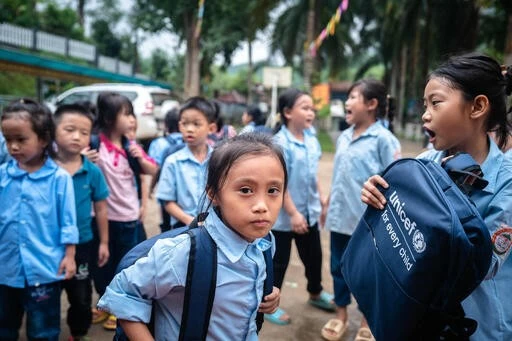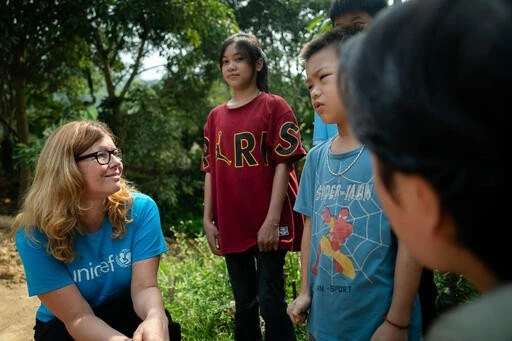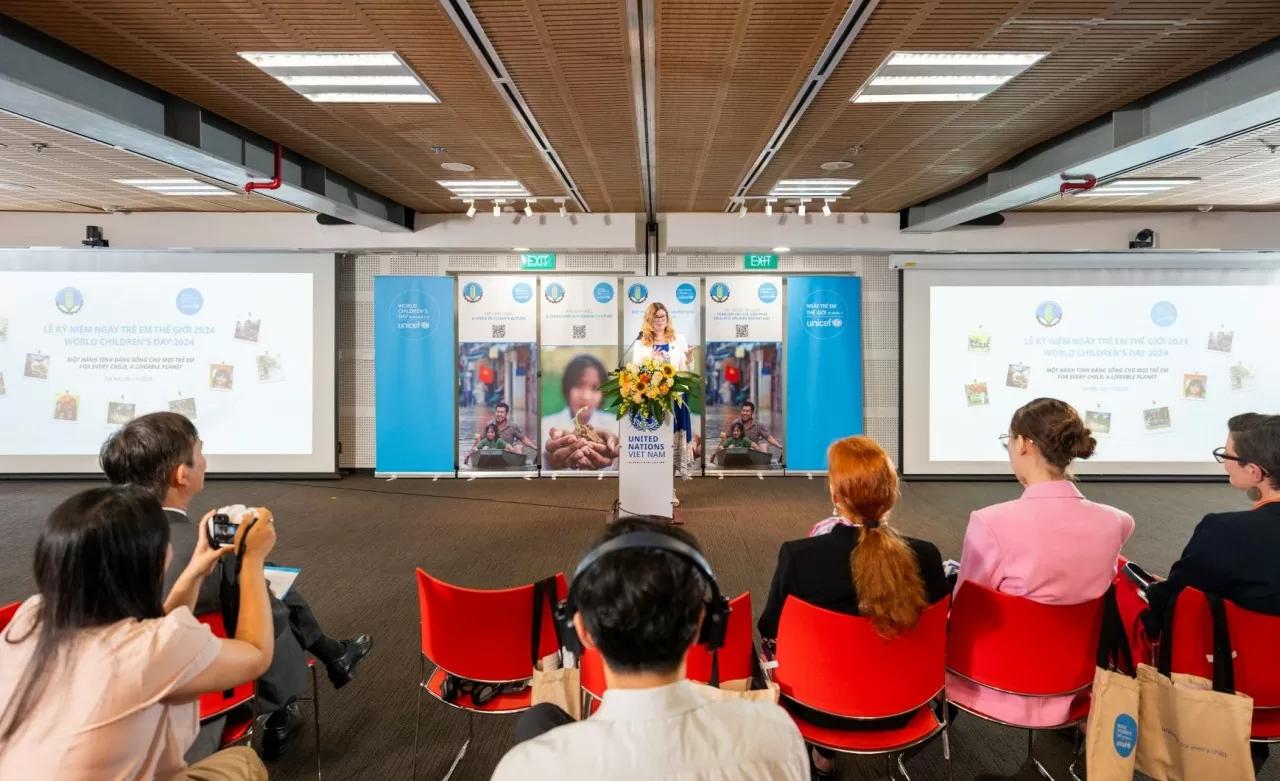
Vietnam has made commendable strides towards enhancing children's rights during 35 years: UNICEF Representative
Latest
 |
| UNICEF Representative in Vietnam Silvia Danailov visited children in Yen Bai after Typhoon Yagi. (Photo: WVR) |
How would you broadly assess Vietnam's achievements in realising child rights in line with of the United Nations Convention on the Rights of the Child (CRC) since it was ratified in February 1990?
I would like to commend the Vietnam’s Government strategic decision to become the first country in Asia and second in the world to ratify the Convention on the Rights of the Child, the global treaty focused on children’s wellbeing and protection.
By ratifying the Convention, Vietnam recognized that children have inalienable rights and committed to turn child rights into action. Over the past 35 years, the Government of Vietnam has made commendable strides towards enhancing children's wellbeing, development and protection. This is evidenced by, for example, the significant reduction in under-five mortality rates of children, from 52 per 1000 live births in 1990 to 16.9 per 1000 live births in 2024. The prevalence of child stunting - a condition where a child is too short for their age due to chronic or recurrent malnutrition - has been considerably reduced by over half, dropping from 44 per cent in 1990 to 18.2 per cent in 2023.
There has also been a significant increase in access to improved water and sanitation, from 45 per cent and 29 per cent in 1990 to 99 per cent and 95 per cent in 2024, respectively. Through sustained investments in the social sectors, today, children in Vietnam are more protected against violence, neglect and abuse than previous generations and the majority enjoy access to primary and secondary education and adequate healthcare and have a life expectancy surpassing that of their parents. All these are great achievements for child rights – the right to health, nutrition, education, child and social protection.
Vietnam has also made important progress on strengthening the legal and policy framework for child rights and continues its efforts to strengthen the key systems that put child rights into practice. For instance, the 2016 Children's Law was passed, and amendments were made to the Education Law, Labour Code, and the Law on Statistics. Vietnam has initiated reforms in its child justice system, including the establishment of specialized Family and Juvenile Courts. As a recent development, the Law on Justice for Minors was passed on November 30 last year and the Decree on Social Work was adopted.
The country has also established the National Committee for Children as a key coordinating body for government authorities from different sectors and adopted several national action programmes for children to ensure the comprehensive implementation of the CRC.
 |
| UNICEF Representative in Vietnam Silvia Danailov in a field trip. (Photo: WVR) |
What are some of the challenges Vietnam is facing in advancing child rights in line with the CRC, particularly for the most vulnerable groups?
During my recent travels to remote villages, I witnessed first hand some of the challenges that vulnerable communities face – especially if faced with severe shocks like Typhoon Yagi. Limited access to healthcare, adequate nutrition, clean water and sanitation as well as interruption of education and loss of income and livelihoods have negatively impacted children's well being.
I recall the devastation etched in the faces of children and families when Typhoon Yagi ripped through their lives, leaving many of them with nothing. Witnessing their struggle to recover and rebuild was both heartbreaking and inspiring. Despite these overwhelming adversities, what struck me the most was their strong spirit. Their resilience and positivity, in the face of such hardships, is a testament to their strength and determination.
However, the reality remains that these struggles are far from over. Like many other countries, Vietnam is still facing with socio-economic disparities that disproportionately affect the most vulnerable groups of children, including those who are poor, living with disabilities, from ethnic minorities, or impacted by migration and, increasingly, also by climate change.
The journey towards achieving the 2030 Sustainable Development Goals (SDGs) has been patchy with uneven progress in several areas, requiring a more urgent and focused approach.
Given that the CRC was adopted 35 years ago, does it maintain its relevance in today's societal context?
CRC is the most widely ratified treaty in history and has helped transform children’s lives around the world. It is a compass for all countries and societies putting the well-being and development of their under-18 populations at the heart of their priorities. As we commemorate this milestone and celebrate Vietnam’s key achievements, we cannot forget that not every child gets to enjoy their childhood, and children rights are not yet fulfilled. Many girls and boys have not been able to enjoy the benefits of Vietnam’s socio-economic development.
So, the Convention is even more relevant and urgent in the current context, with remaining challenges of inequalities, child poverty and violence. Additionally, global trends are bringing new opportunities and challenges: the rise of digital technology, climate change, and the rapid demographic shifts. These trends have a profound impact on children.
As Vietnam is striving to become a high-income country by 2045, child rights and investing in children will remain key to ensure a better life for the population. This is what makes the Convention truly relevant in today’s context.
 |
| Silvia Danailov, , UNICEF Representative in Vietnam speaks at the event. (Photo: UNICEF) |
What measures should Vietnam implement to enhance the realization and protection of children's rights more effectively?
Vietnam has been consistently advancing the child rights agenda. For example, the Government has recently adopted the recommendations of the UN Committee on the Rights of the Child, which provide a strong basis for an action plan for enhancing children's rights in the country. For reference, this committee is an assembly of independent experts that monitors implementation of the Convention in the different countries.
UNICEF would like to highlight several key measures that can help Vietnam address the new global trends impacting the lives of its young population:
Relating to the digital transformation: Vietnam, like many other countries, ought to bridge the digital divide, enhancing children’s digital skills and online safety. There is an urgent need to invest in technology that is child-friendly as well as update the regulatory framework to protect children from emerging online risks.
Relating to the impact of climate change, it is important to enhance preparedness, resilience and response to climate and environmental crises by creating climate-resilient infrastructure and essential service. Investing in green energy is also essential, as well as involving children and young people in climate related decisions.
Relating to the demographic trends: investing in human capital is key for countries like Vietnam aiming to transition from middle to high-income status. With a declining child population, it is essential to invest in children now for future growth. Sustained investment is crucial, with a focus on the most vulnerable: children with disabilities, those migrating, and ethnic minority children amongst others.
And finally, we need to protect children from violence, ensure that all children have access to essential services in health, nutrition and education, and end poverty by strengthening systems that work for the most vulnerable children.
Allow me to provide a final comment in the context of the on-going transformational government restructuring reform. The reform presents promising opportunities for children, particularly through an increased focus and enhanced capacity. It is crucial that child rights remain at the heart of government efforts to ensure that Vietnam can effectively advance the rights of children through strong policies, effective coordination, and decisive action.
UNICEF is in Vietnam to support this transformation. We are a proud partner engaging with the national authorities and stakeholders for the past 50 years. Our comprehensive programme in country began in 1975 –even before the Convention on the Rights of the Child existed. As we commemorate 35 years of Vietnam's ratification of this Convention, UNICEF stands ready to deepen and accelerate our action for Vietnam’s new era.













